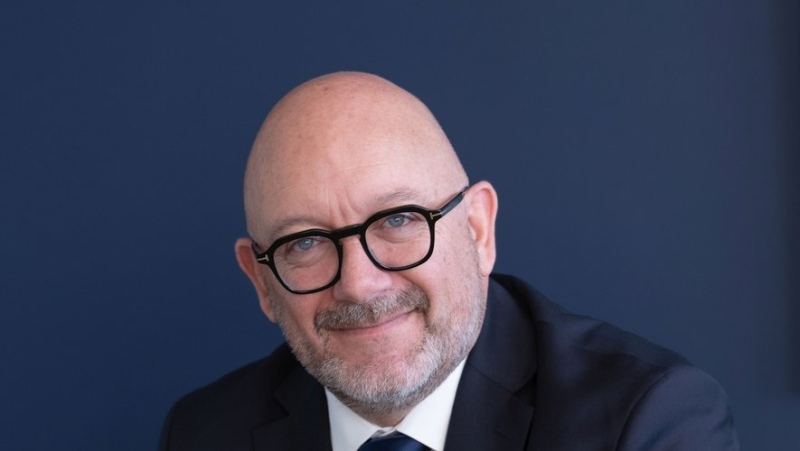“Free money is definitely behind us”: general director of Banque Populaire du Sud, Cyril Brun nevertheless announces a drop in rates to around 3.5%


Cyril Brun, general manager of the Banque Populaire du Sud: “Monetary policy had led to an increase in prices in general, and real estate in particular”. Mario Sinistaj
The boss of the regional bank deciphers the home ownership and real estate loan market. It delivers an optimistic message: rates will continue to fall.
What position does the BPS occupy on the regional real estate market ?
Banque Populaire du Sud is present in the territory of the expanded former Languedoc Roussillon. We are present from Ariège to Ardèche, via Montpellier, Nîmes, Perpignan and Carcassonne. Our position on the real estate market is very strong, since one in four real estate loans in our region is carried out by the Banque populaire du sud. We are a major player in home ownership for individuals. On the professional side, we have been elected, for the fourteenth consecutive year, the leading business bank in the region, by a Kantar barometer. No less than 62% of businesses in the region have an account with the BPS. Which means that today, we have a dual perspective, that of being the accompaniment of individuals for real estate projects and at the forefront of the companies working for this. sector.
How is your bank getting through the current period of real estate crisis ?
We experienced a very special year 2023. There was the shock of the rate rise, which was absolutely extraordinary. In our region, the average duration of real estate loans is 22 years. In 18 months, someone who borrowed, over this period, at 1.75% started borrowing at 4.55%. But the peak of the highest rates is now behind us. Very concretely, someone who, before this increase, borrowed 220,000 euros, repaid 1,000 euros per month. With the increase, it rose to 1,320 euros. This means 30% more per month, for the same amount borrowed.
This increase in rates came up against the budgets of households who wanted housing. Some were able to adapt their repayment capacity, others did not have this capacity. Many waited for a drop in property prices. There was a small drop in prices of around -5% in the Montpellier region. In other areas, such as the Pyrénées-Orientales or Gard, there was no decline. But I remind you that -5%, is not -30%, as some hoped. I don't believe in a market drop of -30%. It's more like -5%. This restores a little flexibility, but for all that, this shock in rates has hampered real estate transactions, with sellers who did everything not to lower their prices, and buyers who, for some, could no longer buy or were waiting for the rates are falling.
This gave us a year of 2023, during which we still lent 950 million euros in real estate loans. This represents a real estate loan every quarter of an hour. What was very notable was that two thirds of these loans were made in the first six months of the year. From the summer onwards, the market seized up very sharply, due to the lack of transactions. But our desire to lend was always present.
How much did you lend per year in previous years ?
We were more like around 1.2 billion. This means that last year we recorded a drop of around 30% to 35% in volumes. Which, in fact, corresponds to the evolution of the market. We experienced this rise in rates by continuing to lend, with the responsibility of not over-indebting people and ensuring that it was always consistent with their budget.
There was a lot of talk about the supply deficit, there were fewer homes for sale ?
There are two different topics on this offer theme. There is an offer on new properties. There, indeed, there is, in real estate development, a deficit of goods for sale. But on the old one, it continued. We are also in a territory which has a demographic dynamic which means that there is demand. A market, it's supply and demand, but also trust. Anticipation of the future. A number of people said that now was not the right time to buy. They put themselves in a waiting situation. This expectation is partly true, since prices have fallen by 5% and rates are falling, but for all that, we are looking at a long time. The subject is: at what point is my real estate project a current project, with the desired property available ? The situation has meant that in 18 months, things have changed. Before the machine seized up, the power was with the seller. There, very clearly, it is today the buyer's. Power has changed sides. Someone who is a buyer today and has secured their financing project will find the offer that suits them and will, above all, be in a position to negotiate the price. Two years ago, in our region, the power to negotiate was almost zero. Today, this is no longer the case. The buyer has more power.
For what reason ?
The seller, having fewer candidates, is obliged to listen. He is even more attentive when he is dealing with someone who has well prepared their financing file. Many of our loyal customers come to us asking us to secure their ability to borrow over a specific amount. They then set off in search of the desired product with complete security of their financing plan. Helped in this also by the fact that the rate of 4.55%, which was in November, has become 4.05% today. The rate cut has therefore already taken place. Since the start of the year, we at Banque Populaire du Sud have already revised downwards our loan and real estate rate scales twice. In the space of four to five months, they were lowered by 0.50%.
Does an individual have room for negotiation with banks ?
What I just talked to you about is the exit rate, the average rate that our bank offers. This average corresponds, indeed, to very solvent profiles, which will break the 4% bar, and then others who are less so and which mean that we are rather on the safe side. 4.25%. We are therefore on a range going from 0.30% to 0.40%, between a very secure profile and a less secure profile. I would like to point out that someone who has a solid solvency situation will not borrow over 25 years, they will rather do so over 20 years. And over 20 years, it will borrow at less than 4%. There is an important psychological bar there. Between 3.50% and 4%, we return to rates historically known in the past. We are also coming out of a period which was extraordinary in terms of rate levels. Borrowing at less than 2.5% was unheard of. Over 20 years, there have even been loans below 1%.
It has been said that the banks had closed the credit tap during the difficult period in order to regenerate. Is it true ?
I would not allow myself to comment on the other banks, but for the Banque Populaire du Sud, this is absolutely not the case. What motivates us during this type of period is not to exceed the reasonable budget for our customers. Intrinsically, we have all the liquidity to be able to lend. There is one thing that is simple and logical: real estate loans made in previous years are carried in our balance sheet for the entire duration. This means that today I have a return on my real estate loan portfolio which is less than 2%, corresponding to the loans granted in past years. I therefore have every interest in seeing these loans replaced by today's loans, around 4%. Everyone's interest is for the market to become more fluid, for real estate professionals, households and banks.
Isn't the blocking of lending activity due to the weakness in the supply of new housing ?
No, because sales of new products only represent 17% to 20% of the volume of transactions on primary residences in France. We cannot say that it is the real estate development situation that is blocking the market. The subject is only about the fact that the rates are no longer at all. of the same level, which increases the cost of money. The free money is definitely behind us. The market must therefore land on a rate level that allows flexibility to be restored to the market. And this rate level is returning to normal.
What is the evolution of rates observed since the start of the year ?
Compared to the last quarter of 2023, we sense a shudder and a restart. If we compare the first quarter of 2024 compared to the first quarter of 2023, we are on a decline.
How far can rates fall in 2024 ?
We are halfway there. My prediction is that in a year we will be around 3.50%. Then it won't move anymore. We must understand that the free money and the level of rates that we experienced in the past were an abnormality. We must mourn it. We will no longer be able to borrow at 2% over 25 years.
Why an abnormality ?
In the time before the pandemic, from 2012 onwards, there was a political will to flood the market with financial liquidity at extremely low prices, or even negative rates. This desire to inject liquidity into the economy was achieved by making money free. This is to regain growth momentum. Today, this is no longer a subject, but, above all, the Central Bank, the States, have realized that when we go too far in excessive liquidity, it was very difficult to go back. This gave rise to the inflationary spiral. If we want to regulate inflation, we must increase rates and bring them to a reasonable level to prevent inflation from soaring again. It is this point of balance that is being sought. Monetary policy had led to an increase in prices in general, and real estate in particular. This made the cost of credit painless for economic actors. Except that money has a price.
You were talking about trust. What do you mean by that ?
It is fundamental. To invest, you have to have confidence in the future. And having confidence in the future means having confidence in your professional situation, your family situation. It’s telling yourself that you’re not getting a bad deal. Hence the fantasies about a drop in prices of 20% to 25%, which we have heard. It's the kind of fantasy that destroys confidence. We tell ourselves that we are not going to buy today, that in eight months it will be 25% cheaper. This won't happen. At least not in our region. Confidence means telling yourself that you will buy real estate today, which will be cheaper than two years ago. That's clear, but it will be done in a rather reasonable proportion. Buying a property in a year means buying it at almost the same price as today. Borrowing at 4% is much cheaper than 4.55%. And with a target of 3.5% within a year, it’s absolutely not expensive.




